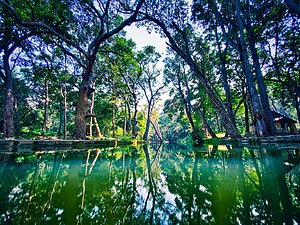The aim of this page is to recognise, celebrate and encourage the self-empowerment of community agency networks (CANs) and community groups across Andhra Pradesh.

Education[edit | edit source]
Anuragam is the Tsunami education project of Bosco Seva Kendra in four districts of Andhra Pradesh in India.
Bosco Seva Kendra is the development office of the Salesian Province of Hyderabad of the Don Bosco Mission. Salesians of Don Bosco are the implementors of this programme.
Biodiversity[edit | edit source]
The diversity of fauna includes tigers, leopards, dholes, black bucks, cheetals, sambars, sea turtles, and a number of birds and reptiles. The estuaries of the Godavari and Krishna rivers support rich mangrove forests with fishing cats and otters as keystone species.[77] The state has many sanctuaries and national parks, such as Coringa wildlife sanctuary, Nagarjunsagar-Srisailam tiger reserve, Kolleru bird sanctuary, and Nelapattu bird sanctuary. W
The Dolphin Nature Conservation Society (DNCS) is a registered (no. 507/2001) voluntary environmental non-profit and non-governmental organization (NGO) located in Visakhapatnam, Andhra Pradesh, India. It is committed to the causes of nature conservation, environmental protection, research, education, and awareness. The society was founded on March 5, 2001, by Dr. Mantha Rama Murty and Dr. Mangathayi, who had previously launched several nature conservation programs in Andhra Pradesh, particularly in Visakhapatnam. The organization's activities are intended to instill a love for nature and conservation among people, especially among the younger generation. Notable research, documentation, conservation, and awareness campaigns of the society have involved Olive-Ridley Sea Turtles, intertidal rocky shore fauna and flora of the Visakhapatnam coast, and butterflies of the Eastern Ghats. The society's flagship project is the development and maintenance of the Biodiversity Park in Visakhapatnam.
Biodiversity Park, Visakhapatnam, is a botanical garden, an ex situ conservation park, first of its kind in Visakhapatnam, Andhra Pradesh, India. The park is located in the premises of the Rani Chandramani Devi Government Hospital. It extends over 3 acres (1.2 ha). Dolphin Nature Conservation Society (DNCS), Visakhapatnam, a registered, eco-friendly, non-government organization, has maintained it for 13 years and is now maintaining it in collaboration with the hospital and Visakhapatnam Metropolitan Region Development Authority. The park was inaugurated on 5 June 2002. This park has more than 2,000 species of plants. and has recorded visits by 60 species of birds and 105 species of butterflies. The park has become a "living laboratory" for education, awareness and research for students, and botanists, zoologists and researchers.
The sacred groves is a zone of Biodiversity Park, Visakhapatnam located in the premises of Rani Chandramani Devi Government Hospital. It has more than 100 sacred plant species, which are medicinal herbs with religious importance. Many sacred plants are becoming rare and endangered. Hence they are to be reared, protected, and conserved. The zone was inaugurated on February 5, 2017, by Kambhampati Hari Babu, a member of parliament from Visakhapatnam, Andhra Pradesh.
Trees, woodland and forest[edit | edit source]
Andhra Pradesh (English: , Telugu: [aːndʱrɐ prɐdeːʃ] abbr. AP) is a state in the southern coastal region of India. It is the seventh-largest state with an area of 162,970 km2 (62,920 sq mi) and the tenth-most populous state with 49,577,103 inhabitants based on 2011 census data. It shares borders with Odisha to the northeast, Chhattisgarh to the north, Telangana to the northwest, Karnataka to the southwest, Tamil Nadu to the south, and the Bay of Bengal to the southeast. It has the second-longest coastline in India at about 974 km (605 mi). After existence as Andhra State and unified Andhra Pradesh, the state took its present form on 2 June 2014, when the new state of Telangana was formed through bifurcation. Amaravati is the capital of the state, with the largest city being Visakhapatnam. Telugu, one of the classical languages of India used by the majority of people, is the first official language.
About Andhra Pradesh[edit | edit source]
Andhra Pradesh (English: , Telugu: [aːndʱrɐ prɐdeːʃ] abbr. AP) is a state in the southern coastal region of India. It is the seventh-largest state with an area of 162,970 km2 (62,920 sq mi) and the tenth-most populous state with 49,577,103 inhabitants based on 2011 census data. It shares borders with Odisha to the northeast, Chhattisgarh to the north, Telangana to the northwest, Karnataka to the southwest, Tamil Nadu to the south, and the Bay of Bengal to the southeast. It has the second-longest coastline in India at about 974 km (605 mi). After existence as Andhra State and unified Andhra Pradesh, the state took its present form on 2 June 2014, when the new state of Telangana was formed through bifurcation. Amaravati is the capital of the state, with the largest city being Visakhapatnam. Telugu, one of the classical languages of India used by the majority of people, is the first official language.